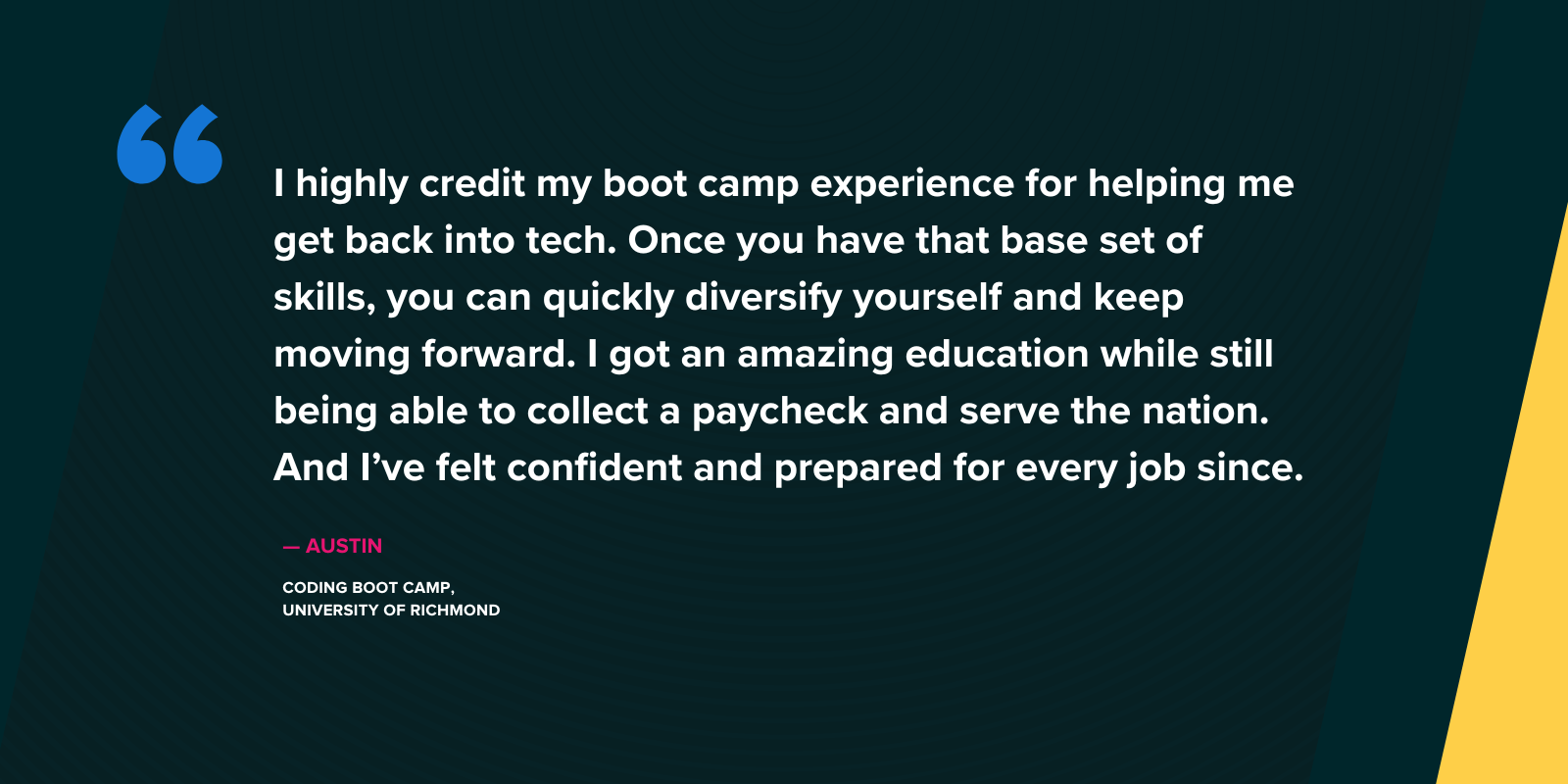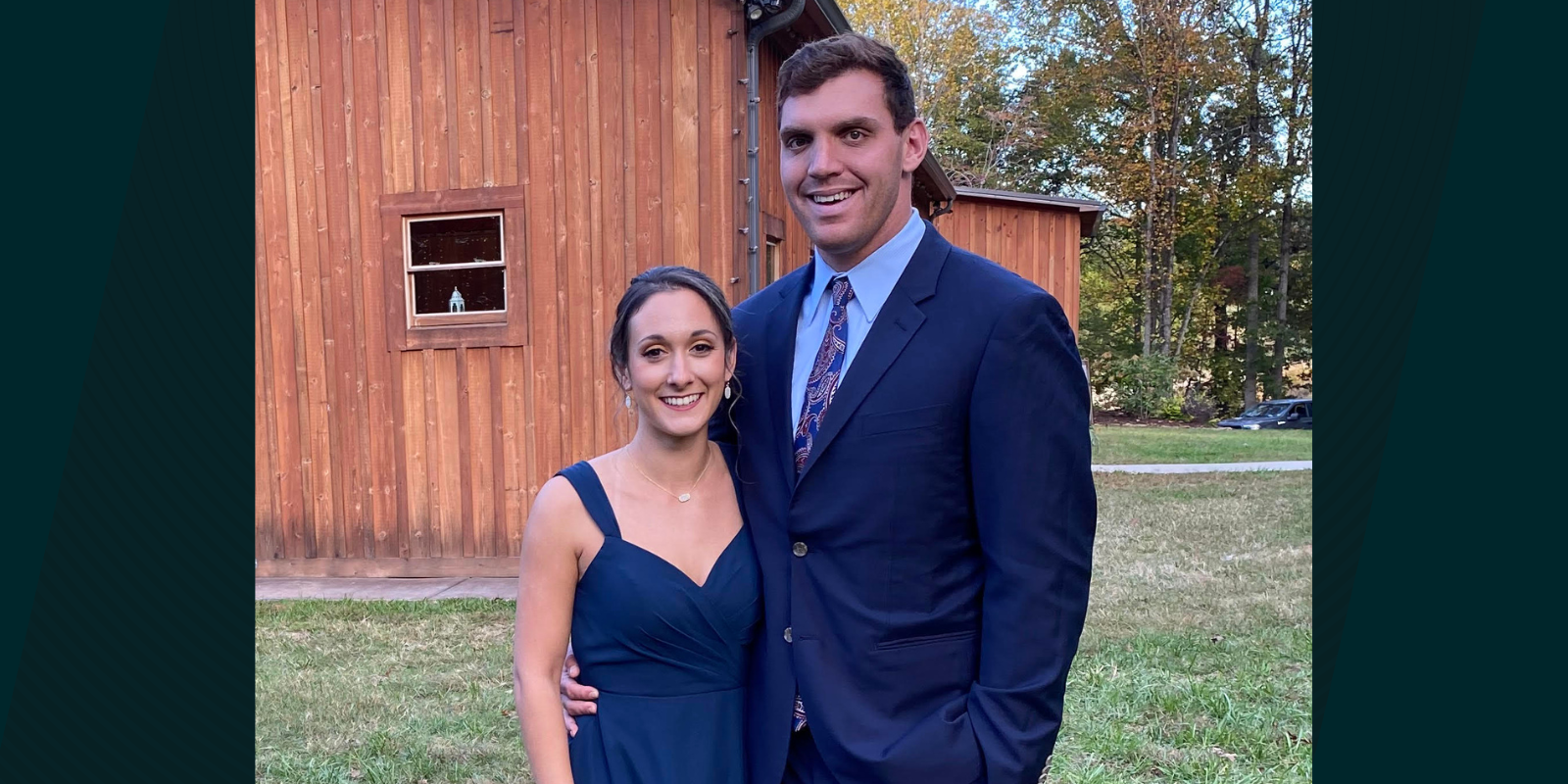From U.S. Naval Officer to Software Engineer: Transitioning to Civilian Life with an Online Boot Camp
Meet Austin. He used the University of Richmond’s Coding Boot Camp to refresh his tech skills and navigate the shift from the military to the private sector.
Austin is just one of the millions of learners who've leveraged the power of online education on edX to transform their lives, their communities, and our world for the better. Discover even more inspiring stories of learner success in our 2022 Transparency & Outcomes Report.
After nearly a decade of service with the U.S. Navy, Austin Hague was confronted with a feeling he was not used to in his transition to civilian life: uncertainty.
He had graduated from the U.S. Naval Academy in 2018 and worked his way through the ranks, excelling in operations, equipment management, and logistics along the way. His exceptional work ethic led him to join the “Seabees”—the Navy’s prestigious construction battalion—where he oversaw multimillion-dollar projects and facilitated complex stakeholder communications.
But as he neared the end of his five-year service commitment, Austin knew it was time to start a new chapter in his career. He wanted to get back to the software focus of his undergraduate degree in robotics and material engineering. However, tech had rapidly evolved since his graduation. He had some catching up to do in order to be a competitive candidate in the field.
“I knew a lot about embedded software with C++, MATLAB, and object-oriented programming,” he says. “But I had no experience with modern web development—front-end versus back-end, UI versus databases, that kind of thing. I wasn't very confident that my skills were current enough.”

Mission: Possible
While exploring his post-service options, Austin connected with a friend who had graduated from the University of Richmond’s Coding Boot Camp. His friend recommended he check out the online program, saying it could be a viable way for Austin to invest in his future while finishing up his Navy obligations.
"What struck me was that I could do the part-time boot camp at night and still be a naval officer during the day,” Austin says. “I really wanted to get my fingers back on a keyboard, and this was an easy way for me to get a ton of hands-on experience, fast.”
Austin followed his friend’s advice and decided to enroll. The boot camp started off with a quick review of the basics like HTML and CSS before diving into more intricate web development technologies like JavaScript and the MERN stack. He appreciated the program’s fast pace and especially enjoyed the frequent group work.
“Every time we did a breakout session, it was with new classmates of different skill levels and perspectives,” he says. “I think that really upgraded my educational experience.”
For their final project, Austin and his team created an Airbnb-style application that helps music artists and venues find each other. Figuring out how to interconnect user profiles, booking activities, and payment functionalities was a true test of the skills they had learned—and that’s where Austin’s passions emerged.
“The project challenged me beyond my expectations,” he says. “But I fell in love with the back-end side of web development. I realized that’s what I wanted to do with software engineering moving forward.”
The program’s strong community of support also helped Austin feel inspired and ready to make his next career move.
“The boot camp wasn't just about learning,” he says. “It created a crew of motivated folks who had each others’ backs. Some of my classmates are now buddies I regularly catch up with. I’m particularly grateful to our instructor, who kept emphasizing that your network is your biggest asset.”

Updated Skills and a Fresh Start
A month after completing the boot camp, Austin’s hard work and networking efforts paid off. While still winding down with the Navy, he was hired as a part-time TA for the program’s next two coding cohorts.
“My student success manager reached out suggesting I’d be great for the role, since the TAs in my boot camp often commented that I was mentoring others in the program just like they did,” he says. “Teaching the skills and troubleshooting processes I had just learned further ingrained the knowledge for me. My favorite part was giving back to a program that had just transformed me into a developer.”
Armed with his new web development skills, Austin was finally able to make the leap to civilian life this past winter—and right into a role that aligned with his career goals. Networking his way through a Navy transition program, he secured a paid internship with The Walt Disney Company as a software engineer. For six months, he worked on two apps that monitor various Disney park programs, adding even more skill sets to his portfolio.
"Disney saw all of my experience with the Navy and the boot camp and knew I could provide value to them,” Austin says. “Being able to apply my skills on that team was a really cool opportunity.”
His career continued to gain momentum into the summer, as Austin seamlessly moved from the Disney internship into a full-time role as a back-end engineer for Peraton, a national security and defense technology solutions provider. A recruiter reached out via LinkedIn and set up a phone call to review his experience, leading to a full interview circuit and official offer from the company.
In his new position, Austin works primarily with postgreSQL and Java, developing APIs and writing unit tests to provide coverage for Peraton’s transformation services. Outside of work, he and his wife (pictured above) also just celebrated their son’s first birthday.
“I highly credit my boot camp experience for helping me get back into tech,” he says. “Once you have that base set of skills, you can use them to quickly diversify yourself and keep moving forward. For me, I got an amazing education while still being able to collect a paycheck and serve the nation. And I’ve felt confident and prepared for every job since.”
Related Content: Partner Impact

